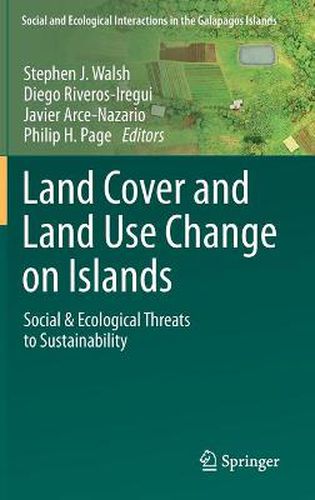Readings Newsletter
Become a Readings Member to make your shopping experience even easier.
Sign in or sign up for free!
You’re not far away from qualifying for FREE standard shipping within Australia
You’ve qualified for FREE standard shipping within Australia
The cart is loading…






This title is printed to order. This book may have been self-published. If so, we cannot guarantee the quality of the content. In the main most books will have gone through the editing process however some may not. We therefore suggest that you be aware of this before ordering this book. If in doubt check either the author or publisher’s details as we are unable to accept any returns unless they are faulty. Please contact us if you have any questions.
Globalization is not a new phenomenon, but it is posing new challenges to humans and natural ecosystems in the 21st century. From climate change to increasingly mobile human populations to the global economy, the relationship between humans and their environment is being modified in ways that will have long-term impacts on ecological health, biodiversity, ecosystem goods and services, population vulnerability, and sustainability. These changes and challenges are perhaps nowhere more evident than in island ecosystems. Buffeted by rising ocean temperatures, extreme weather events, sea-level rise, climate change, tourism, population migration, invasive species, and resource limitations, islands represent both the greatest vulnerability to globalization and also the greatest scientific opportunity to study the significance of global changes on ecosystem processes, human-environment interactions, conservation, environmental policy, and island sustainability. In this book, we study islands through the lens of Land Cover/Land Use Change (LCLUC) and the multi-scale and multi-thematic drivers of change. In addition to assessing the key processes that shape and re-shape island ecosystems and their land cover/land use changes, the book highlights measurement and assessment methods to characterize patterns and trajectories of change and models to examine the social-ecological drivers of change on islands. For instance, chapters report on the results of a meta-analysis to examine trends in published literature on islands, a satellite image time-series to track changes in urbanization, social surveys to support household analyses, field sampling to represent the state of resources and their limitations on islands, and dynamic systems models to link socio-economic data to LCLUC patterns. The authors report on a diversity of islands, conditions, and circumstances that affect LCLUC patterns and processes, often informed through perspectives rooted, for instance, in conservation, demography, ecology, economics, geography, policy, and sociology.
$9.00 standard shipping within Australia
FREE standard shipping within Australia for orders over $100.00
Express & International shipping calculated at checkout
This title is printed to order. This book may have been self-published. If so, we cannot guarantee the quality of the content. In the main most books will have gone through the editing process however some may not. We therefore suggest that you be aware of this before ordering this book. If in doubt check either the author or publisher’s details as we are unable to accept any returns unless they are faulty. Please contact us if you have any questions.
Globalization is not a new phenomenon, but it is posing new challenges to humans and natural ecosystems in the 21st century. From climate change to increasingly mobile human populations to the global economy, the relationship between humans and their environment is being modified in ways that will have long-term impacts on ecological health, biodiversity, ecosystem goods and services, population vulnerability, and sustainability. These changes and challenges are perhaps nowhere more evident than in island ecosystems. Buffeted by rising ocean temperatures, extreme weather events, sea-level rise, climate change, tourism, population migration, invasive species, and resource limitations, islands represent both the greatest vulnerability to globalization and also the greatest scientific opportunity to study the significance of global changes on ecosystem processes, human-environment interactions, conservation, environmental policy, and island sustainability. In this book, we study islands through the lens of Land Cover/Land Use Change (LCLUC) and the multi-scale and multi-thematic drivers of change. In addition to assessing the key processes that shape and re-shape island ecosystems and their land cover/land use changes, the book highlights measurement and assessment methods to characterize patterns and trajectories of change and models to examine the social-ecological drivers of change on islands. For instance, chapters report on the results of a meta-analysis to examine trends in published literature on islands, a satellite image time-series to track changes in urbanization, social surveys to support household analyses, field sampling to represent the state of resources and their limitations on islands, and dynamic systems models to link socio-economic data to LCLUC patterns. The authors report on a diversity of islands, conditions, and circumstances that affect LCLUC patterns and processes, often informed through perspectives rooted, for instance, in conservation, demography, ecology, economics, geography, policy, and sociology.